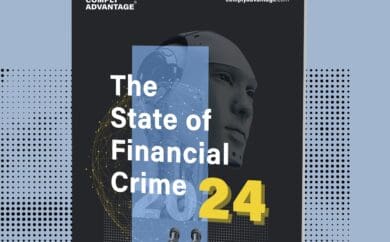 Featured
Featured
From regime change in Myanmar and Afghanistan to a spotlight on environmental crime at COP26 and the explosive Pandora Papers leak, 2021 has been another landmark year for compliance professionals.
But what events from this year are likely to set new global standards? Which headlines are translating into trends that will help shape the AML/CFT landscape into next year? These are the questions we’ll seek to answer in our review of 2021.
Global trends
Human rights-based sanctions programs become the global norm
With its 2016 Global Magnitsky Act, the United States established a blueprint for sanctions programs designed to tackle human rights violations. The adoption of such programs has been expanding ever since, and 2021 could go down as the year in which this approach became the norm. Not only have more countries introduced Magnitsky-style programs in 2021, we have also seen the scope of existing programs expand significantly.
Australia has introduced and expanded its Magnitsky-style program in a single year. Initially, it amended its 2011 Autonomous Sanctions Act. Then in December 2021, the Australian government also passed a new Autonomous Sanctions Amendment (Thematic Sanctions) Act, which widened the scope of its sanctions program to target cyber hackers, human rights abusers and corrupt officials with penalties including deportation and asset seizures. With these legislative changes, Australia became the latest proponent of a human rights-based sanction program, joining the US, Canada, UK and the European Union (EU).
Other countries in this club have been flexing their sanctions programs this year too. In April 2021, the UK expanded its Magnitsky program with the initiation of its Global Anti-Corruption regime, specifically targeting Russia, Africa and Latin America. The US has issued human rights sanctions against China, escalating geopolitical tensions with the country over the repression of the Uyghurs.
As more countries have adopted expanded sanctions powers, a key trend heading into 2022 is the ongoing attempt at taking more coordination sanctions enforcement action. The tensions between China and the US provide a clear example of this, with the UK, Canada and EU joining the US in applying sanctions on China.
Global divergence emerges on crypto regulation
2021 was the year when debates about whether crypto firms should be managed as financial institutions, treated as a new kind of entity or banned altogether came out of the abstract, with governments putting pen to paper through new regulatory initiatives.
At one end of the spectrum sits China. In September 2021 the People’s Bank of China and nine other agencies in the country made all cryptocurrency transactions illegal. Earlier in the year bitcoin mining was also outlawed.
In the European Union (EU), virtual asset service providers (VASPs) are being regulated in line with other firms through the EU’s 6th Anti-Money Laundering Directive (6AMLD). Alongside debates about how to regulate crypto firms, however, sits a parallel debate about what firms should be defined as VASPs or crypto asset service providers (CASPs). The EU is expanding its definition of CASPs with its next Anti-Money Laundering Directive. The goal of this is to bring its framework into alignment with the EU’s Markets in Crypto Assets (MiCA) proposal, and the definition provided by the Financial Action Task Force (FATF). Expect more debates about the definition and regulation of VASPs and CASPs in 2022.
In the US, much of the legislative focus this year has been on the regulation of stablecoins, amid concerns about market panic in the event that a large number of users make withdrawals at once. In its long-awaited report, the President’s Working Group on Financial Markets called on Congress to act, arguing current oversight is “inconsistent and fragmented.” Treasury Secretary Janet Yellen did however comment that “well-designed” stablecoins covered by “appropriate oversight” could “support beneficial payment options.” The recommendation in favor of new legislation vs simply expanding the scope of existing regulations suggests a key trend for 2022 will be debates around what a framework for stablecoins could, or should, look like.
This debate may not be confined to the US alone. With the US government believing coordinated international standards are key to tackling AML/CFT risks associated with stablecoins and the wider crypto sector, 2022 could be the year that a common regulatory framework for cryptocurrencies emerges.
Spotlight falls on environmental crime
The COP26 Summit in Glasgow, alongside initiatives by the FATF, have brought the issue of environmental crime to the top of the financial crime agenda. Dr Marcus Pleyer, the FATF president, explicitly connected efforts to tackle illicit money associated with financial crime to the wider issue of climate change.
The FATF has broken the fight against environmental crime down into two core components: how firms can assess their exposure, and how public and private sector organizations can combat the threat itself. Expect to see more guidance on the issue at the FATF’s next plenary in February 2022.
Hotspots get hotter: Myanmar, Belarus and Afghanistan
A February 1st military coup led to coordinated international action against the new government of Myanmar, including asset freezes and blocks on the property of persons operating in the defense sector. The US has continued to pressure the country, stating in December 2021 that additional sanctions remain “on the table.” However, some states in the region – including Cambodia – are beginning to argue that engagement should restart with Myanmar, and it should be allowed to rejoin the Association of Southeast Asian Nations (ASEAN). These emerging debates on how to balance political, economic and trade- based considerations will likely grow further in 2022.
Belarus has been a key focus for the EU in particular, following the regime’s May 2021 decision to ground a flight travelling over Minsk en route to Lithuania in order to arrest an opposition journalist who was on board. As of December 2021, the EU has sanctioned 166 individuals and 15 entities, including President Alexandr Lukashenko and other key government figures. As the year comes to a close, tensions with the regime are far from resolved, with Lukasheno threatening to cut off supply to a Russian gas pipeline that runs through the country in response to any fresh measures. With a new government in Germany, an April presidential election in France and continued disputes over the Nord Stream 2 gas pipeline, expect issues related to energy, Russia, Belarus and the politics of the EU to generate additional uncertainty for AML/CFT teams in the year ahead.
The abrupt Taliban takeover of Afghanistan in August led the US to freeze $9bn in assets belonging to the country’s central bank, and triggered a widespread reassessment of firms’ ties with local entities and individuals. While the long-term picture remains uncertain, personal remittances have been allowed to continue to support the provision of humanitarian aid to the country. An estimated $789m in remittances were processed in 2020, highlighting the dependency of many in the country on payments from migrant workers overseas. However, asset freezes have still plunged the country into “the worst hunger crisis since records began” making further discussion of if and how to work with the Taliban government inevitable.
Pandora Papers leak reignites the question of beneficial ownership
For anyone who followed the Panama and Paradise Paper leaks, the exposure of 11.9 million confidential files in October 2021 in what was dubbed the “biggest trove of leaked offshore data in history” may well have felt familiar. Beyond the flurry of headlines focused on high profile individuals named in the leak, the longer term issue for compliance teams concerns beneficial ownership. Deficiencies in how offshore and shell companies are regulated could become the major legacy of the leak.
In its response to the Pandora Papers, the FATF expressed frustration that, having proposed global beneficial ownership standards almost two decades ago, a majority of countries still had not acted. The body is now assessing the results of a consultation on changes to its Recommendation 24, designed to increase transparency around the beneficial ownership of legal persons. These included stronger, more specific language on the measures countries should take, and the prohibition of bearer shares, which remain in use in some jurisdictions In the US, the Financial Crimes Enforcement Network (FinCEN) has also proposed new beneficial ownership rules, as part of the federal government’s countering corruption strategy.
Quickfire regional regulatory trends
In addition to these global trends, here are some of the major developments that have occurred at a regional level.
North America:
- On June 30th, FinCEN issued a 180-day update on the implementation of the Anti-Money Laundering Act (AMLA), noting progress on issues including the art and antiquities trade, beneficial ownership reporting and a new set of national AML/CFT priorities.
- The final parts of Canada’s Proceeds of Crime (Money Laundering) and Terrorist Financing Act (PCMLTFA) came into effect in June, including new rules on beneficial ownership, reporting for large virtual currency transactions and requirements around prepaid cards.
- In October, the Office of Foreign Assets Control (OFAC) issued new sanctions compliance guidance for the virtual currency industry, including how to block a virtual currency that is in breach of OFAC regulations.
- Also in October, FinCEN released a landmark report on ransomware-related SAR filings, which showed that the number filed in the first six months of 2021 was already 30% higher than the total for 2020 as a whole.
Asia-Pacific:
- For much of the second half of 2021, debate raged about the implementation of China’s Anti-Foreign Sanctions Law (AFSL), and specifically whether it would apply in Hong Kong. The AFSL marked China’s first attempt to set out a framework for countering foreign sanctions, but caused consternation in Hong Kong due to its major role in international trade and finance.
- Regulators in the region continued to innovate in the field of data sharing. In September the Monetary Authority of Singapore (MAS) launched a new platform to enable financial institutions in the country to digitally warn each other about unusual activity in customers’ accounts.
- The FATF issued a host of mutual evaluation and follow-up reports on countries in Asia Pacific throughout 2021, including Japan. The country was judged to be in need of ‘enhanced follow-up’ after its review in August. Notable reports were also issued on New Zealand, the Philippines, Thailand and Myanmar.
Europe:
- On day one of 2021, the UK’s transition period out of the European Union ended amid a cloud of uncertainty as to where, how and to what extent the country would diverge from the EU’s AML/CFT programs. So far, with several exceptions, few major differences have emerged.
- June 3rd marked the implementation deadline for 6AMLD, the latest anti-money laundering directive from the European Union. Almost as soon as the ink dried, the EU announced plans for its next tranche of reforms, including a new EU-wide Anti-Money Laundering Authority (AMLA).
- However, in its implementation of 6AMLD Germany went beyond the parameters of the regulation and refined money laundering in the country’s criminal code. Money laundering no longer needs to be connected to a predicate offense in Germany, significantly lowering the proof threshold for prosecutors.
- Despite the roll out of 6AMLD in 2021, the spectre of 5AMLD still loomed large in parts of Europe, with many countries entering the year having failed to fully transpose its requirements into local legislation. As a result the European Union launched “infringement proceedings” against 22 countries including Austria, Belgium, Croatia, Cyprus, Czech Republic, Denmark, Estonia, France, Ireland, Greece, Hungary, Lithuania, Luxembourg, Malta, Netherlands, Poland, Portugal, Romania, Slovakia, Slovenia, Spain and Sweden.
What’s next?
Our 2022 State of Financial Crime report, based on a survey of 800 compliance teams from around the world, covers the latest trends in SAR filings, typologies, cryptocurrencies, geopolitical hotspots and much more.
Missed out?
If you’ve missed any of our major research reports from 2021, you can still download them using the links below:
- Looking Ahead to 6AMLD
- A Guide to Anti-Money Laundering for Broker Dealers
- A Guide to the Anti-Money Laundering Act (AMLA)
- Brexit and AML/CFT: What Does the Future Hold?
- The Evolving Use of Sanctions
- Anti-Money Laundering Regulation in the Art and Antiquities Markets
- A Guide to Anti-Money Laundering for Digital Banks
Originally published 23 December 2021, updated 05 April 2023
Disclaimer: This is for general information only. The information presented does not constitute legal advice. ComplyAdvantage accepts no responsibility for any information contained herein and disclaims and excludes any liability in respect of the contents or for action taken based on this information.
Copyright © 2024 IVXS UK Limited (trading as ComplyAdvantage).



 EN
EN